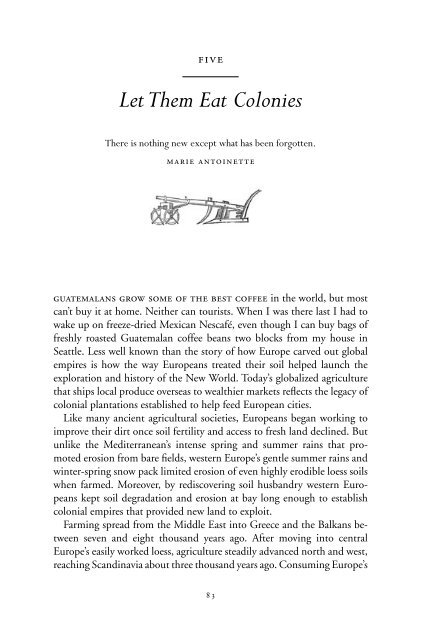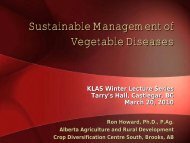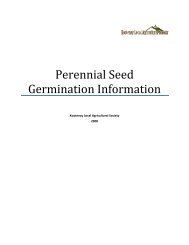- Page 2 and 3:
Dirt
- Page 4 and 5:
Dirt the erosion of civilizations D
- Page 6:
For Xena T. Dog, enthusiastic field
- Page 10:
acknowledgments This book could nev
- Page 13 and 14:
2 Yet what is dirt? We try to keep
- Page 15 and 16:
4 discovered ways to enhance soil f
- Page 17 and 18:
6 quent centuries, nutrient depleti
- Page 20 and 21:
two Skin of the Earth We know more
- Page 22 and 23:
villa in Gloucestershire lay undete
- Page 24 and 25:
When we behold a wide, turf-covered
- Page 26 and 27:
Soil not only helps shape the land,
- Page 28 and 29:
ter and mineral soil. Billions of m
- Page 30 and 31:
Topography also affects the soil. T
- Page 32 and 33:
Wind can pick up and erode dry soil
- Page 34 and 35:
Combinations of soil horizons, thei
- Page 36:
much. This leaves the issue in a po
- Page 39 and 40:
28 Ice Age was not a single event.
- Page 41 and 42:
30 For much of the last century, th
- Page 43 and 44: 32 Abu Hureyra sat on a low promont
- Page 45 and 46: 34 wheat dating from 10,000 years a
- Page 47 and 48: 36 Domesticated livestock not only
- Page 49 and 50: 38 inated the southern Mesopotamian
- Page 51 and 52: 40 of a high load of dissolved salt
- Page 53 and 54: 42 direct water to particular place
- Page 55 and 56: 44 by the color of dirt eroded from
- Page 57 and 58: 46 out the region, he concluded tha
- Page 60 and 61: four Graveyard of Empires To Protec
- Page 62 and 63: the constitution, proposed a ban on
- Page 64 and 65: Figure 7. Parthenon. Albumen print
- Page 66 and 67: est soils from hillsides disturbed
- Page 68 and 69: Figure 8. Map of Roman Italy. follo
- Page 70 and 71: the Roman heartland became increasi
- Page 72 and 73: ically let a piece of ground lie fa
- Page 74 and 75: foot thick, it probably took at lea
- Page 76 and 77: into densely planted olive farms—
- Page 78 and 79: families a few centuries earlier. T
- Page 80 and 81: classic, supporting three editions
- Page 82 and 83: on the edge of the Arabian Desert a
- Page 84 and 85: When Moses and company arrived, Can
- Page 86 and 87: urned before the onset of the rains
- Page 88 and 89: sion in the Mayan of the Petén not
- Page 90 and 91: Archaeological records from this pe
- Page 92: The contrast between how the Pueblo
- Page 97 and 98: 86 to a thousand years. Soil profil
- Page 99 and 100: 88 land and birch forest. Following
- Page 101 and 102: 90 Figure 10. Miniature from an ear
- Page 103 and 104: 92 the early 1300s to about two mil
- Page 105 and 106: 94 the Danes improved their sandy d
- Page 107 and 108: 96 layers, ’till we arrive to the
- Page 109 and 110: 98 recipe for degrading soil fertil
- Page 111 and 112: 100 vived on vegetables, gruel, and
- Page 113 and 114: 102 French Alps lost a third to mor
- Page 115 and 116: 104 Despite such profiteering, by 1
- Page 117 and 118: 106 from the smallest rill to the g
- Page 119 and 120: 108 A potato blight that arrived fr
- Page 121 and 122: 110 uries such as sugar, coffee, an
- Page 123 and 124: 112 Subsequent foreign investment o
- Page 126 and 127: six Westward Hoe Since the achievem
- Page 128 and 129: A few miles in from the forest edge
- Page 130 and 131: wherein one man by his owne labour
- Page 132 and 133: Particularly in the South, the read
- Page 134 and 135: worn out, and washed and gullied, s
- Page 136 and 137: explained that American farmers had
- Page 138 and 139: marle County Agricultural Society i
- Page 140 and 141: purchased a farm in the 1820s. A de
- Page 142 and 143: Figure 14. Charles Lyell’s illust
- Page 144 and 145:
Traveling through much of the South
- Page 146 and 147:
Tensions came to a head after the S
- Page 148 and 149:
But this still doesn’t explain th
- Page 150 and 151:
Figure 16. North Carolina gully sys
- Page 152 and 153:
more than three thousand years and
- Page 154 and 155:
settlements for several thousand ye
- Page 156 and 157:
seven Dust Blow One man cannot stop
- Page 158 and 159:
land-hungry settlers. From 1878 to
- Page 160 and 161:
without the least reference to the
- Page 162 and 163:
Figure 18. Breaking new land with d
- Page 164 and 165:
Figure 19. Dust storm approaching S
- Page 166 and 167:
taxes, and other unavoidable expens
- Page 168 and 169:
Figure 21. Plowing a steep hillside
- Page 170 and 171:
tion of heavy machinery and agroche
- Page 172 and 173:
Soil erosion rapidly became a major
- Page 174 and 175:
egion. There are few reliable measu
- Page 176 and 177:
ing with the Germans, Kalmyks were
- Page 178 and 179:
grazing animals doubled; the human
- Page 180 and 181:
years. Present rates of erosion, ho
- Page 182 and 183:
land was being exhausted. Although
- Page 184 and 185:
In 1958 the Department of Agricultu
- Page 186 and 187:
eplacing water-holding capacity los
- Page 188:
ing on access to fresh land or find
- Page 191 and 192:
180 our way in that the backyard wo
- Page 193 and 194:
182 Figure 23. Chinese farmers plow
- Page 195 and 196:
184 less, he experimented with agri
- Page 197 and 198:
186 Figure 24. Lithograph of mounta
- Page 199 and 200:
188 fiscated the remaining lands th
- Page 201 and 202:
190 Hilgard rightly dismissed the p
- Page 203 and 204:
192 important was the mix of silt,
- Page 205 and 206:
194 ping would exhaust the natural
- Page 207 and 208:
196 atmospheric nitrogen. On July 2
- Page 209 and 210:
198 increases in crop production.
- Page 211 and 212:
200 Estimates for when petroleum pr
- Page 213 and 214:
202 ground—turning our dirt into
- Page 215 and 216:
204 greater tonnage of machinery pe
- Page 217 and 218:
206 may prove our best hope for mai
- Page 219 and 220:
208 tilizers, hosts the longest ong
- Page 221 and 222:
210 soil fertility and exporting po
- Page 223 and 224:
212 No-till farming is very effecti
- Page 225 and 226:
214 It is no secret that if agricul
- Page 227 and 228:
216 some consumed their future and
- Page 229 and 230:
218 Pollen preserved in lake sedime
- Page 231 and 232:
220 washed off the slopes now bury
- Page 233 and 234:
222 ply. So topsoil loss retarded f
- Page 235 and 236:
224 different fates. Tikopia develo
- Page 237 and 238:
226 where vegetation stabilizes the
- Page 239 and 240:
228 0 50 100 km inhabitants. Two ce
- Page 241 and 242:
230 pushes peasants from hillside s
- Page 243 and 244:
232 gardens grew up throughout the
- Page 245 and 246:
234 Credible scientists also disagr
- Page 247 and 248:
236 notice the problem. Like a dise
- Page 249 and 250:
238 asters. Larger societies, with
- Page 251 and 252:
240 before plants have all they can
- Page 253 and 254:
242 faster than it is replaced dest
- Page 255 and 256:
244 figuring the downstream end of
- Page 257 and 258:
246 Meeting this challenge would al
- Page 259 and 260:
248 10. Marsh 1864, 9, 42. 11. Lowd
- Page 261 and 262:
250 6. USDA 1901, 31. 7. Whitney 19
- Page 263 and 264:
252 Schwartzman, D. W., and T. Volk
- Page 265 and 266:
254 Beach, T., S. Luzzadder-Beach,
- Page 267 and 268:
256 and human response. In Environm
- Page 269 and 270:
258 Lang, A. 2003. Phases of soil e
- Page 271 and 272:
260 Cronon, W. 1983. Changes in the
- Page 273 and 274:
262 Bennett, H. H., and W. R. Chapl
- Page 275 and 276:
264 Saiko, T. A. 1995. Implications
- Page 277 and 278:
266 Jackson, W. 2002. Farming in na
- Page 279 and 280:
268 ———. 1925. Soil and Civil
- Page 281 and 282:
270 and economic costs of soil eros
- Page 283 and 284:
272 agricultural practices (continu
- Page 285 and 286:
274 Columella, Lucius Junius Modera
- Page 287 and 288:
276 farm subsidy programs: conventi
- Page 289 and 290:
278 Joppa Town, Maryland, 140 Judso
- Page 291 and 292:
280 nitrogen fertilization (continu
- Page 293 and 294:
282 Sea of Galilee (Lake Kinneret),
- Page 295 and 296:
284 technological innovation (conti
- Page 297:
Text: 11.25/13.5 Garamond Display:






